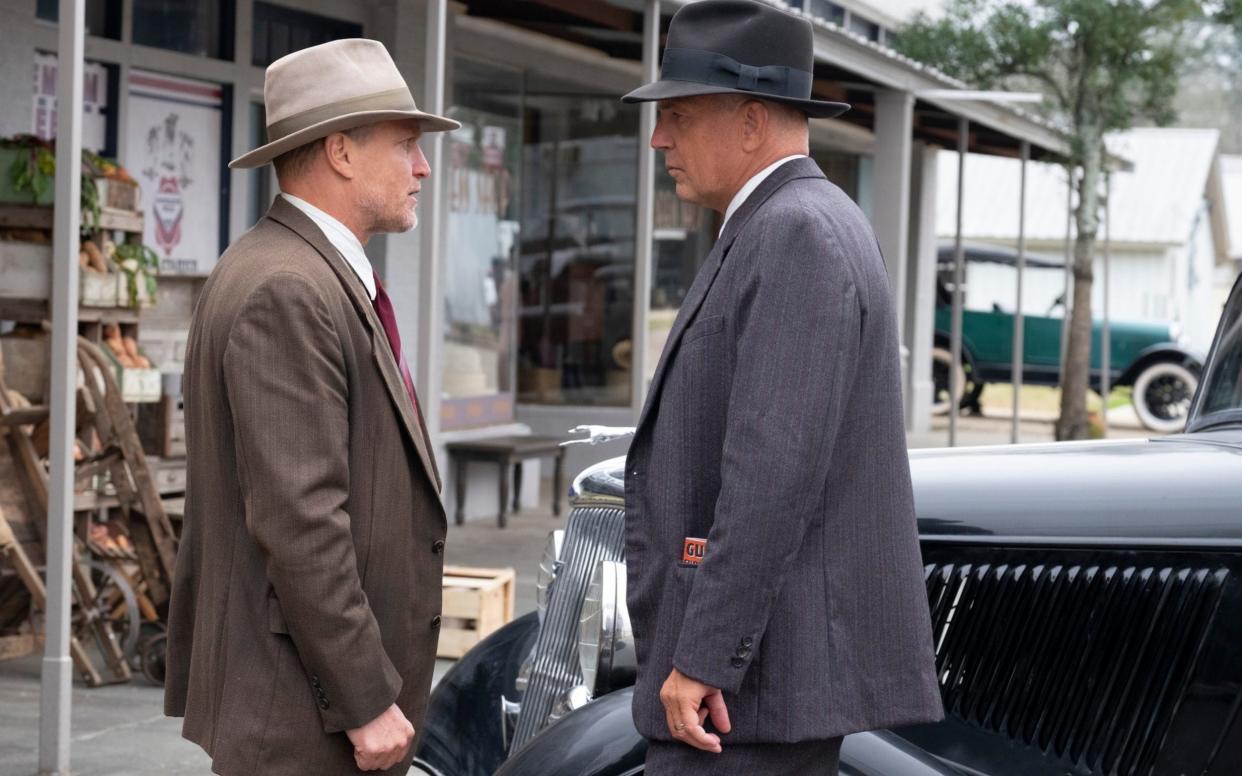The Highwaymen review: exit Bonnie and Clyde, pursued by two loveably grumpy cops

Dir: John Lee Hancock; Starring: Kevin Costner, Woody Harrelson, Kathy Bates, John Carroll Lynch, Emily Brobst, Edward Bossert. 15 cert, 132 mins.
Kevin Costner aficionados have had to get by on flecks and nuggets of late: a film-stealing cameo as Jessica Chastain’s father in Molly’s Game, a beneficent NASA bod in Hidden Figures, whatever on earth he was doing in Batman v Superman: Dawn of Justice. But this huskily handsome Netflix period piece, about the lawmen who brought down Bonnie Parker and Clyde Barrow, cracks open a lustrous new seam.
Costner plays Frank Hamer, a retired Texas Ranger who is coaxed back into service by the state’s governor Miriam ‘Ma’ Ferguson (Kathy Bates), in the hope his grizzled knowhow can bring an end to these cool, young, sexy outlaws’ crime spree. Hamer is clearly none of the above, but he is played by a bona fide movie star, and when we see him in profile on the deck of his ranch, pulling on a cigarette as rain falls softly in the moonlight, there can be no doubt whose side we’d rather be on.
Hamer’s sidekicky partner, Maney Gault, is played by Woody Harrelson, who also gets his share of ennobling close-ups, often with a brow-crinkling monologue thrown in for good measure. But the duo’s quarry, Bonnie (Emily Brobst) and Clyde (Edward Bossert) themselves, get no such dignity. No Warren Beatty/Faye Dunaway glamour or folk-hero worship here: instead, the pair are only shown obscured or at a remove until the grisly end, when we finally see the whites of their eyes at the selfsame fateful moment Hamer does.
For a film to position itself as the “other side” of this particular story without at least acknowledging the Arthur Penn’s incendiary Bonnie and Clyde from 1967 would be unwise: that’s whose back it is going behind, after all. Director John Lee Hancock (Saving Mr Banks, The Founder) revives a handful of famous images and tricks, including the gunshot sound effects turned up to deafening levels, and the plumes of dirt kicked up by the cops’ and crooks’ sedans as they career along the dirt tracks of the Depression-era American West. (A terrific wide shot after one such chase, showing a crop-circle swirl of tyre tracks in a field, makes it clear that Hamer and Gault have literally been led a merry dance.)
But Hancock’s method, unlike Penn’s, is conservative down to the bone. Instead of madcap banjos, there’s a plangent orchestral score from Thomas Newman, while cinematographer John Schwartzman is working in a stately, elegant style that might be called “Shawshank classical”.
Yet this all suits The Highwaymen’s grumpy-old-men perspective, as the two Rangers try to get the upper hand on not just their young nemeses, but also newfangled law enforcement (the phone-tapping FBI are “high-flying sissies”), the beginnings of celebrity culture, a newly rapacious media, and, in Gault’s case, even his own uncooperative prostate. “What’s the world coming to?” Harrelson actually sighs at one point, after which you half-expect the camera to cut to Rick Wakeman complaining about “chuggers”.
As history records, it was the grumpy old men who won this round – yet in cinema, the tale of Bonnie and Clyde became the myth that set the counter-culture alight. That tension niggles away within The Highwaymen, a sporadically stodgy, dour production which often seems painfully aware that the really fun stuff is happening out of shot. But then Costner and Harrelson get to talking, the light lands on their features just so, and the film casts its own curmudgeonly spell.

